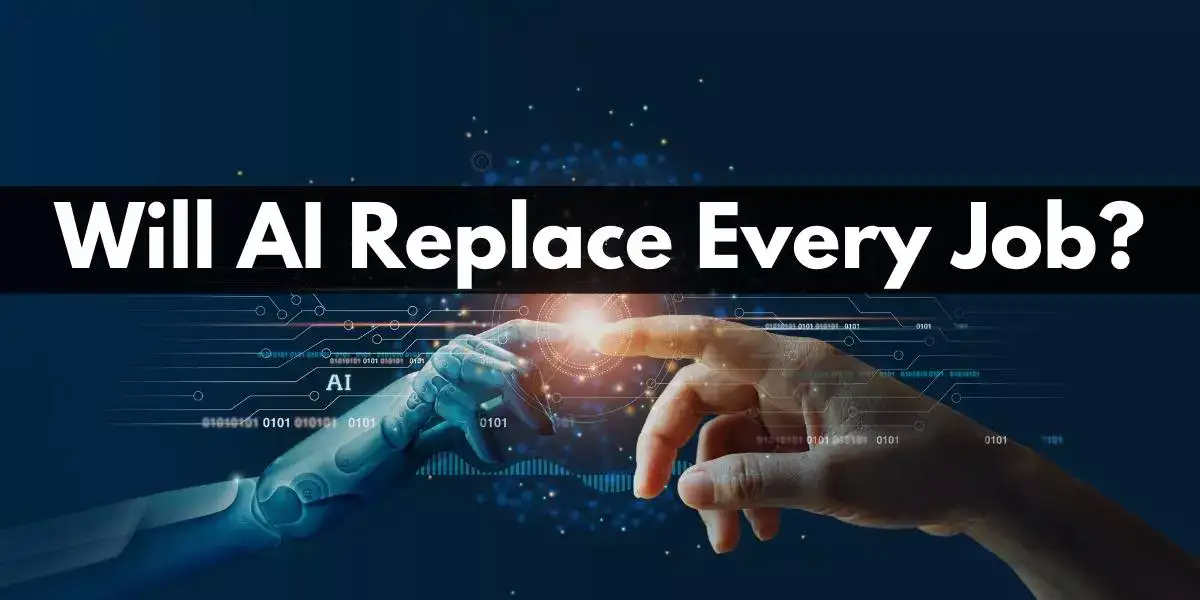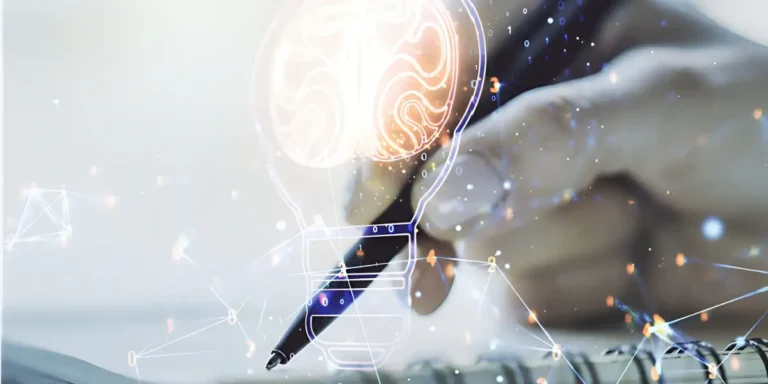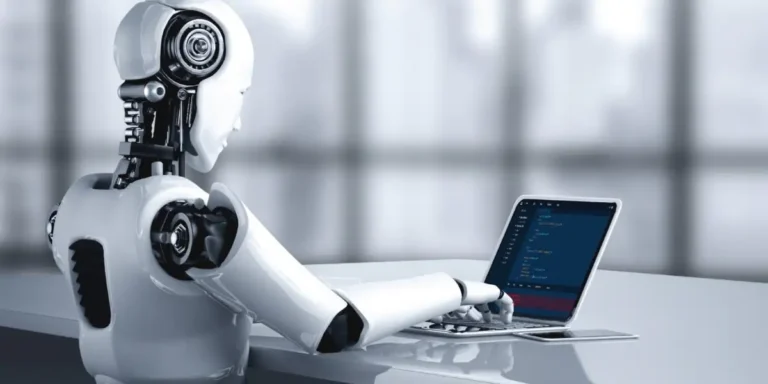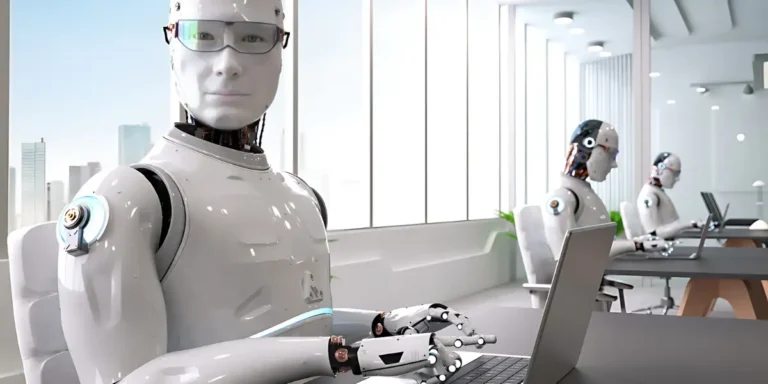Will AI replace all jobs? This thought-provoking subject has dominated conversations about the rapid growth of artificial intelligence (AI) and its influence on the workforce. As AI technology improves, it raises concerns about human job displacement in numerous areas.
This article will delve into how AI is transforming the job market, Jobs at risk due to AI. we’ll also explore the required skills for the job holder to stay relevant with AI and the ethical considerations of AI in the job sector.
Let’s explore the fascinating realm of AI and its implications for our professional lives.

Will AI Replace Every Job?
No, AI will not replace every job. While AI technology may automate certain tasks and roles, it is more likely to augment human capabilities and create new job opportunities rather than completely replace human workers.
How AI Is Transforming Human Job Industries

Automation Revolutionizing Routine Tasks
AI technology has revolutionized how repetitive and mundane tasks are carried out across various industries.
It has led to many tasks automation, freeing human workers to focus on more complex and strategic responsibilities. This has not only increased efficiency and productivity but also reduced errors.
Manufacturing, logistics, and data entry industries have benefited significantly from AI-powered automation.
With the use of robotics and machine learning, mundane tasks that were previously carried out by human workers are now being automated.
This has led to higher productivity and increased safety in industries such as manufacturing.
Enhanced Decision-Making with AI Analytics
The use of AI-powered analytics and data processing tools has revolutionized decision-making processes.
By analyzing vast amounts of data quickly, AI algorithms provide valuable insights, enabling businesses to make informed choices in finance, marketing, and risk assessment.
The ability of AI to identify patterns and trends has significantly enhanced the accuracy of decision-making.
It has also accelerated business growth by providing businesses with insights that were previously impossible to obtain.
For example, AI-powered analytics can provide businesses with insights into customer behavior, which can be used to optimize marketing strategies and increase sales.
Personalized Customer Experiences
AI-driven technologies such as chatbots and virtual assistants are transforming customer service interactions.
These technologies use natural language processing and machine learning to offer personalized support, efficient issue resolution, and 24/7 availability.
Customer-centric industries such as retail, hospitality, and healthcare are benefiting significantly from improved customer experiences.
Chatbots can handle customer inquiries and process transactions, making customer service more efficient.
They can also provide personalized recommendations to customers, enhancing the customer experience. In industries such as healthcare, AI-powered virtual assistants can provide patients with personalized medical advice and support.
Revolutionizing Healthcare with AI Applications
AI revolutionizes healthcare by improving diagnostics, treatment plans, and patient care. Machine learning algorithms analyze medical data, aiding in the detection of diseases, predicting outcomes, and suggesting personalized treatments.
Robotics and AI-enabled devices assist in surgical procedures, ensuring precision and enhancing patient safety.
AI-powered medical devices can continuously monitor patients, providing real-time feedback to healthcare professionals.
This has significantly improved patient outcomes and reduced the need for hospital readmissions.
AI is also used to develop personalized patient treatment plans, leading to better outcomes and improved patient care.
Driving Innovation in Finance and Banking
AI is reshaping the finance and banking sectors by automating fraud detection, risk assessment, and portfolio management tasks.
Natural language processing enables chatbots to handle customer inquiries and process transactions. AI-powered algorithms enhance trading strategies, portfolio optimization, and financial forecasting.
AI-powered financial tools are also being used to analyze data and identify previously undetected patterns. This has led to more accurate predictions and better decision-making in the financial sector.
In addition, AI-powered financial tools have significantly reduced the time it takes to process financial transactions, making the financial sector more efficient.
AI in Education: Personalized Learning and Assessment
The education industry is embracing AI to deliver personalized learning experiences. AI algorithms analyze student performance data, adapting educational content to individual needs.
Automated assessment tools efficiently grade assignments and provide timely feedback, fostering student engagement and optimizing educational outcomes.
AI-powered educational tools are also being used to personalize the learning experience for students.
For example, AI-powered educational software can adapt to a student’s learning pace, providing them with personalized feedback and support.
This has significantly improved student outcomes and increased engagement in the learning process.
AI Collaboration with Humans for Creative Endeavors
Contrary to replacing human creativity, AI is collaborating with humans in creative industries.
AI tools assist artists, designers, and writers by generating ideas, providing design suggestions, and automating repetitive tasks.
This partnership between AI and human creativity leads to innovative breakthroughs and pushes the boundaries of artistic expression.
Jobs At Risk: Industries Most Susceptible To AI Disruption

Manufacturing:
Automation and robotics advancements are increasingly replacing manual labor in manufacturing processes, jeopardizing jobs in assembly lines and repetitive tasks.
The manufacturing industry is witnessing a significant transformation due to advancements in automation and robotics.
Machines equipped with artificial intelligence are increasingly replacing manual labor in various manufacturing processes.
Tasks that involve assembly lines and repetitive actions are particularly susceptible to disruption by AI technologies.
As a result, traditional manufacturing jobs face a higher risk of being replaced by AI-powered systems.
Transportation and Logistics:
Autonomous vehicles and AI-driven logistics management systems are poised to impact jobs in driving, delivery, and logistics coordination.
The transportation and logistics sector is on the brink of significant changes as AI technologies enter the industry.
The emergence of autonomous vehicles threatens the jobs of truck drivers, taxi drivers, and delivery personnel.
Additionally, AI-driven logistics management systems are streamlining operations, reducing the need for manual coordination and administration roles.
This industry is highly vulnerable to AI disruption, leading to potential job losses.
Customer Service:
AI-powered chatbots and virtual assistants are revolutionizing customer service interactions, potentially reducing the need for human customer support representatives.
With the rise of AI-powered chatbots and virtual assistants, customer service interactions are transforming.
AI technologies can handle a wide range of customer queries and provide instant responses, reducing the need for human intervention.
As a result, traditional customer support roles are at risk of being replaced by AI-driven systems that can efficiently handle customer inquiries, complaints, and support needs.
Data Entry and Administrative Tasks:
AI automation and machine learning algorithms increasingly perform data entry and administrative tasks, which could lead to job displacement.
Data entry and administrative tasks that involve repetitive and rule-based activities are prime candidates for AI automation.
Machine learning algorithms can now process large amounts of data, extract relevant information, and perform administrative tasks more efficiently.
Consequently, jobs that primarily involve data entry and administrative functions face the risk of being replaced by AI systems that can complete these tasks with speed and accuracy.
Retail:
AI-powered self-checkout systems and online shopping platforms are reshaping the retail industry, potentially impacting jobs in cashiering and traditional retail sales.
The retail industry is experiencing a significant shift with the advent of AI-powered self-checkout systems and the rise of online shopping platforms.
Self-checkout kiosks equipped with AI technologies reduce the need for human cashiers, while e-commerce platforms automate the shopping process.
These advancements pose a risk to jobs in cashiering and traditional retail sales, as AI disrupts the traditional brick-and-mortar retail model.
Banking and Finance:
AI-driven algorithms and automated processes transform tasks such as data analysis, fraud detection, and customer support in banking and finance.
In the banking and finance industry, AI is revolutionizing tasks that require data analysis, fraud detection, and customer support.
AI-driven algorithms can analyze large datasets, identify patterns, and provide valuable insights for decision-making.
Automated processes powered by AI technology streamline operations, reducing the need for human intervention.
Jobs in these areas could be at risk as AI continues to disrupt and streamline banking and finance operations.
Healthcare:
AI applications in diagnostics, medical imaging, and data analysis augment healthcare professionals and impact roles such as radiologists and medical transcriptionists.
The healthcare sector is witnessing the integration of AI applications in various areas.
AI technologies can assist healthcare professionals in diagnostics, medical imaging analysis, and data-driven decision-making.
While these advancements enhance the capabilities of healthcare professionals, they also pose challenges to specific roles.
For instance, the roles of radiologists and medical transcriptionists may be impacted as AI systems improve accuracy and efficiency in these areas.
Preparing For The Future: Skills That Will Thrive Alongside AI

Embrace Lifelong Learning
In a world driven by AI, continuous learning is crucial. Stay curious, seek new knowledge, and actively engage in self-improvement.
Take advantage of online courses, workshops, and educational resources to enhance your skills and stay updated with the latest advancements in your field.
Develop Critical Thinking
Nurture your ability to analyze and evaluate information critically. AI excels at processing vast amounts of data, but human judgment and reasoning are essential for complex decision-making.
Sharpen your critical thinking skills by practicing problem-solving, logical reasoning, and considering multiple perspectives.
Cultivate Creativity
Creativity is a uniquely human trait that AI struggles to replicate. Develop your creative thinking abilities by exploring new ideas, engaging in artistic pursuits, and thinking outside the box.
Embrace innovation and adaptability to generate fresh insights and solutions that AI cannot match.
Hone Emotional Intelligence
AI lacks the ability to understand and empathize with human emotions. Strengthen your emotional intelligence by enhancing your self-awareness, empathy, and interpersonal skills.
Cultivate effective communication, collaboration, and relationship-building capabilities to thrive in a human-centric work environment.
Master Complex Problem-Solving
As AI automates routine tasks, focus on developing expertise in solving complex problems.
Sharpen your analytical skills, break down intricate challenges into manageable components, and employ systematic problem-solving methodologies.
Become adept at identifying patterns, finding innovative solutions, and adapting to dynamic situations.
Nurture Adaptability and Flexibility
AI-driven advancements bring rapid changes. Embrace adaptability and flexibility to navigate evolving work environments.
Emphasize agility, willingness to learn new technologies, and ability to adapt to new roles or responsibilities quickly. Embracing change will help you thrive alongside AI rather than being left behind.
Enhance Interdisciplinary Skills
AI integration often requires interdisciplinary collaboration. Acquire knowledge in adjacent fields, broaden your skill set, and foster interdisciplinary thinking.
Connecting different domains and working effectively across disciplines will make you invaluable in AI-driven teams and projects.
Cultivate Ethical Awareness
With the rise of AI, ethical considerations become increasingly important. Understand the ethical implications of AI technologies, such as privacy, bias, and transparency.
Stay informed about AI ethics frameworks and advocate for responsible AI development and usage.
Strengthen Leadership and Management Skills
AI may change the dynamics of leadership, but human leadership qualities remain vital. Enhance your ability to inspire, motivate, and lead teams.
Develop effective management skills, including strategic thinking, decision-making, and fostering a positive work culture.
Embrace Human-Machine Collaboration
Rather than fearing AI as a competitor, embrace the potential for human-machine collaboration. Explore ways to leverage AI as a tool to enhance your work and productivity.
Understand its strengths and limitations, and find ways to integrate AI technologies seamlessly into your workflow.
Ethical Considerations And Human Oversight In The Era Of AI

The Importance of Ethical Considerations in AI Development
In the fast-paced advancement of AI, ethical considerations play a crucial role. AI developers and researchers must prioritize ethical frameworks to ensure responsible and unbiased AI systems.
The development process should involve robust ethical guidelines, transparency, and accountability to avoid potential biases and discriminatory outcomes.
Addressing Bias and Discrimination in AI Algorithms
AI algorithms can inadvertently reflect biases present in the data used for training. Implementing measures that address bias and discrimination is imperative, ensuring fair and equitable outcomes.
Regular audits, diverse and representative datasets, and continuous monitoring of AI systems are essential to mitigate biased decision-making.
Ensuring Transparency and Explainability of AI Systems
Transparency and explainability are key to instilling trust in AI systems. Users should have access to information on how AI algorithms make decisions.
Explainable AI techniques, such as interpretable models and algorithmic transparency, enable users to understand and question the outcomes, fostering accountability and reducing AI’s “black box” nature.
Safeguarding Data Privacy and Security
As AI systems rely on vast amounts of data, it is essential to prioritize data privacy and security.
Strict data protection measures, encryption techniques, and secure storage protocols should be in place to protect sensitive information from unauthorized access or breaches.
Respecting individual privacy rights is paramount in the era of AI.
Human Oversight and Collaboration with AI Systems
Human oversight is critical to ensure responsible AI deployment. Humans should remain involved in decision-making processes and exercise judgment, particularly in areas involving ethical dilemmas.
Collaboration between humans and AI systems can lead to better outcomes, combining both strengths to make informed and ethical choices.
Regulating AI to Uphold Ethical Standards
Government bodies and regulatory agencies play a vital role in establishing and enforcing ethical standards for AI.
Developing comprehensive regulations that address potential risks and ethical challenges associated with AI is essential to safeguarding public interests and preventing the misuse of AI technology.
Encouraging Ethical AI Adoption and Education
Promoting ethical AI adoption requires educating AI practitioners, policymakers, and the general public about the importance of ethical considerations.
Ethical AI training programs, workshops, and public awareness campaigns can foster a culture of responsible AI development and usage.
Continuous Monitoring and Evaluation of Ethical AI Practices
Ethical considerations should be an ongoing process. Regular monitoring and evaluation of AI systems, feedback loops, and proactive identification of potential ethical issues are necessary.
Continual improvement and adaptation to changing ethical standards will help ensure that AI technologies remain aligned with societal values.
Collaboration Across Disciplines and Stakeholders
Addressing ethical considerations in the era of AI requires collaboration among diverse stakeholders.
Close cooperation between AI developers, ethicists, policymakers, legal experts, and the public fosters a multidimensional approach to tackling complex ethical challenges associated with AI.
Striking a balance Between Innovation and Ethics
Achieving a balance between AI innovation and ethical considerations is crucial. It is possible to push the boundaries of AI while upholding ethical standards.
By integrating ethical considerations from the early stages of AI development, we can ensure that AI technologies serve the collective good and contribute positively to society.
FAQs
What is the likelihood of AI replacing every job?
AI is unlikely to replace every job entirely. While specific tasks may be automated, many jobs require human skills and qualities that AI cannot replicate.
Will AI Eliminate The Need For Human Workers?
No, AI will not eliminate the need for human workers. It will instead augment human capabilities, leading to new job roles and opportunities.
Which Industries Are Most At Risk Of Job Displacement By AI?
Industries that involve routine, repetitive tasks are more at risk of job displacement by AI. Examples include manufacturing, transportation, and customer service.
Can AI Technology Perform Complex And Creative Tasks?
AI technology has made significant advancements but still struggles with complex and creative tasks that require human intuition, empathy, and critical thinking.
Will AI Create New Job Opportunities?
Yes, AI is likely to create new job opportunities in areas such as AI development, data analysis, robotics, and AI ethics, as these fields will require human expertise and oversight.
Should Workers Be Concerned About Their Job Security Due To AI?
While some job roles may be affected by AI, workers should focus on acquiring new skills and adapting to the changing job market. Embracing lifelong learning and staying abreast of technological advancements will help ensure job security.
Conclusion
As we’ve explored the topic of AI replacing every job, it’s clear that while AI technology can automate specific tasks, it is unlikely to replace human workers completely.
Instead, AI is more likely to augment your skills and create new job opportunities.
By staying adaptable, continuously learning, and focusing on developing uniquely human qualities, you can thrive in a job market that embraces the advancements of AI.
Embrace the possibilities and prepare yourself for the exciting future where humans and AI work together harmoniously.




